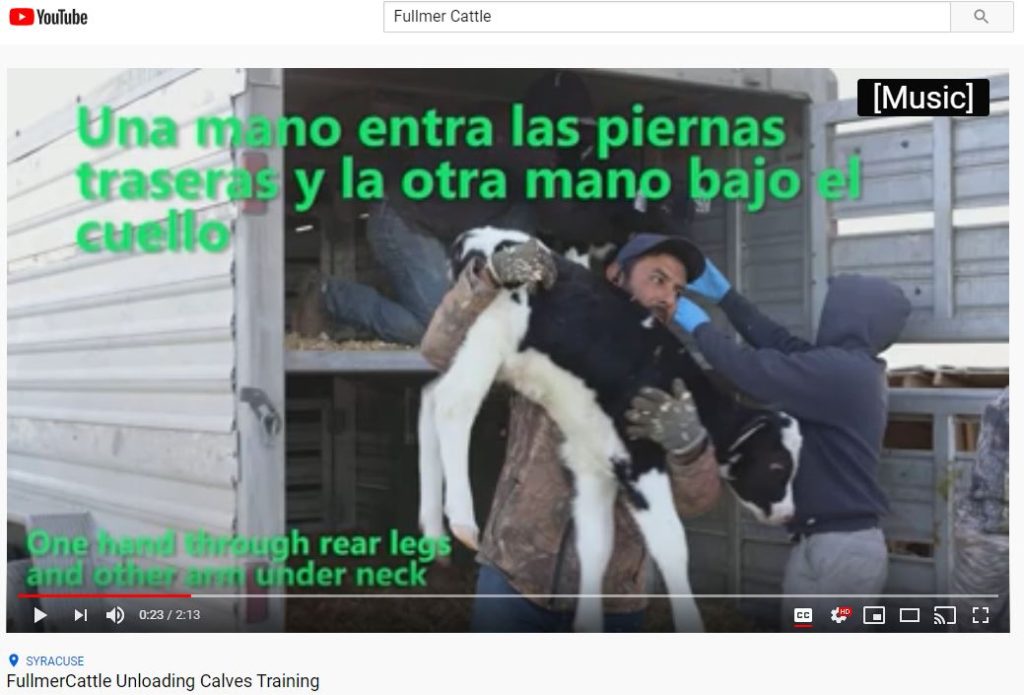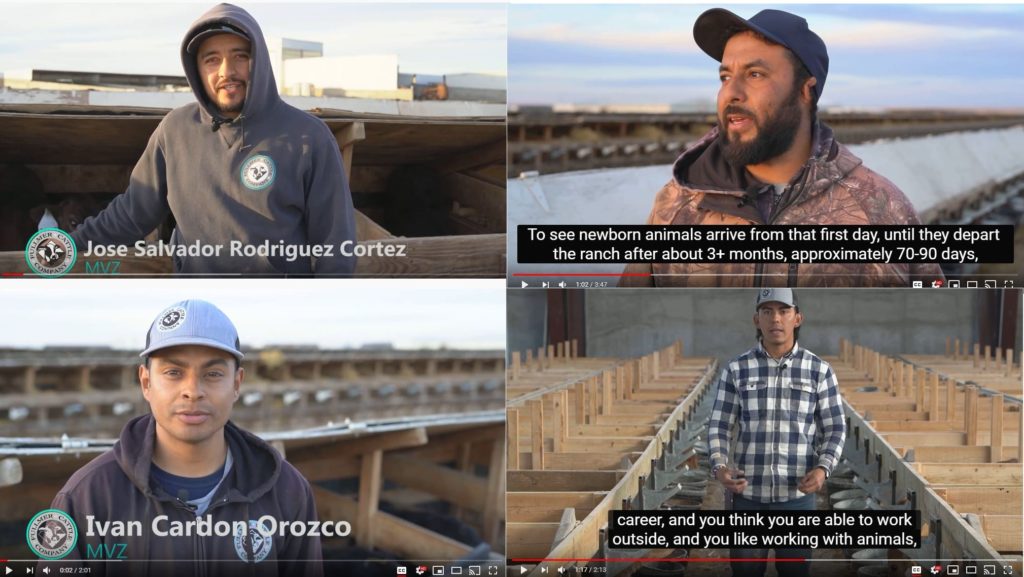The recent USMCA trade agreement is providing opportunities for veterinary and agriculture professionals willing to do arduous work often passed over by USA college graduates.
Biologists, agronomists, zoological technicians and veterinarians with university degrees from Mexico are eager to use their degreed training at agricultural facilities such as Fullmer Cattle Company in Syracuse, Kansas. Under the TN-Visa program, professionals get work opportunities which are not readily available in their native country. These positions have the double benefit of letting these graduates use their professional skills in practical settings without taking away jobs from US citizens.
TN-VISA Gives Ag Professionals Opportunity
Like most countries throughout the world, the USA only allows foreign nationals to work in the USA when it is evident that US citizens are not available for the same position, wage and conditions offered.
“Most veterinary and agri-business graduates who are US citizens can get jobs at much higher wages than we can offer,” according to Fullmer Cattle Company’s Human Resources Manager Laila Kammerman. Additionally, “most don’t want to move away from their families and work in the cold winters and hot, dry summers, for the long hours that calf care requires.”
Kammerman said that such work presents an opportunity for young adults “who are willing to live in rural Kansas and work in the harsh elements of our weather, who are already used to working in their own family operated farms, dairies, and ag supportive industries, including working in remote areas far from the city life accommodations to which USA college graduates are accustomed.”
“No matter what politicians and others from the coasts may say,” she laughed, “ranching and farming is hard work that requires brains and brawn.”
Mexican Ag Professionals at Fullmer Cattle
Kammeman pointed out that ag professionals from Mexico gladly accept wages between $13 –$15 an hour as they work 60 hours a week. In fact, most are glad for the opportunity.
Through a translator, Jose Salvador Cortez, a Veterinarian from Penjamo, Mexico, said: “I tell those interested in working for the company, the process is very rapid. And once you get here, the people treat you very well, very friendly, very attentively. They give you lodging in very nice places, very, very clean, and they welcome you.”
Cortez continued: “For those who are interested in practicing caring for small calves and cattle, this represents a good opportunity to learn, to practice. And it is a good overall opportunity!”
His co-worker Ivan Cardon Orozco, a zoological technician from Morelia, Mexico, agreed, adding: “The work at Fullmer Cattle is not a hard job, not complicated. The work environment is to my liking, very satisfying.”
Orozco pointed out that “There were activities that I didn’t know how to do, but they took the time to be responsible and explain to me how it was to be done, for my better development.”

It’s a Dirty Job, But …
Fullmer Cattle facility manager Ty Fullmer said that the past successes of Mike Rowe, with his “Dirty Jobs” and “Somebody’s Gotta Do It” TV shows, points out the difference between the USA and the rest of the world.
“Those shows are about work that most USA college graduates wouldn’t want to do. If you told someone — other than someone who grew up as a rancher or a farmer — that getting a degree would mean you get up early, feed, clean and care for cattle that don’t want to do what you need them to, in the cold and wind, or the dust and heat, for 60 hours a week, they’d say “No thanks!” And this job isn’t for them.”
“But we have professional ag employees who are grateful for the work. They are learning, they are gaining professional experience. Some of them are even bringing their families up here, because they see the opportunities.”
No Slavery, Just Hard Agricultural Work at Fullmer Cattle
The “Dirty Jobs” show started in part because of reports that positions like these were like “slavery,” and that people were being treated like slaves in the South.
HR Manager Kammerman shakes her head at such comparisons, which she calls unfair and politically charged.
“Is it hard work?” she asked, then answered her own question. “Yes! But slavery? Hardly. People can leave when they want; they don’t have to stay here. They are paid well, and our housing is better than average, with all modern conveniences and appliances included. We outfit our housing with more supplies than college apartments, and we keep them well maintained.”
Kammerman pointed out: “Because we treat them well, we have employees coming back year after year.”
She admits that such work is not for everyone. Some people work for a year, and then don’t return. In addition, “We have had to fire some employees, but there are reasons.” She says that if people don’t want to work, and if they don’t pass supervisor evaluations, they are given warnings before they are let go.
The HR Manager adds that “Fullmer Cattle Company has policies established for a safe and friendly work environment, just like large manufacturing, service, utilities or other companies do.” She said that violations such as stealing and selling supplies, or violating no-drug or other policies, have led to some workers being let go.
Legal Visas and Non-Resident Workers at Fullmer Cattle
Fullmer Cattle also takes great care to work within the laws not only of the United States, but also of Mexico and other countries.
“A few years ago there were false reports about Fullmer Cattle shipping in illegal aliens,” Kammerman said. “Nothing could be further from the truth.” She said that U.S. Immigration and Customs Enforcement (ICE) was tipped off about so-called illegal activities. “As a result, Fullmer Cattle was audited. Then, as now, we operate within the laws of the USA and the trade agreements.”
“It’s a sad state of our society that someone can make accusations to the media and then, just because it was printed, people believe its valid,” she said, adding: “Fake News isn’t just about politicians. It’s been fake news that has cost several qualified professionals from getting their TN Visa work opportunity with our company.”
HR Manager Kammerman tells of a candidate who had applied and accepted a job at Fullmer Cattle. She said that the Mexican Consulate called to confirm that the person was going to work for the calf raising company, as an agricultural professional.
When he arrived at the West Kansas ranch, the employee told the HR Manager that the consulate employee advised him, based on reading the fake news article, not to work for Fullmer Cattle. Fortunately, not only was the ag professional aware of the article, but — because he had a friend on a TN Visa already working for Fullmer Cattle — “he knew the truth.”
“Once the consulate employee heard that,” Kammerman said, “she approved his visa.”
“Unfortunately, there are too many who have lost employment opportunities due to reports from disreputable sources.”
Audits and Experience Reveal The Truth About Fullmer Cattle
This reporter recently learned that, after the ICE audit, a third-party audit was performed by Husch Blackwell Law Firm. In the audit, all 200 employees of Fullmer Cattle Company were interviewed. The result? 100% employee satisfaction. Statements are on file with the company, with employees saying that they were pleased to work for the Fullmer family because the Fullmers treated them very well. Repeatedly they were very thankful for their jobs with a company owned by good caring people.
Ivory Tower Lack of Experience with Agriculture
Fullmer Cattle Company Ranch Manager Ty Fullmer pointed out that this type of misunderstanding often exists between people who work in agriculture, and people who have no experience in that arena.
“They can sit in some city somewhere, in their ivory towers, and say how terrible things are,” Fullmer said. “But the reality is, the yogurt and butter and steak they eat, and the milk they drink, comes from places that require hard work, where you have to get your hands — and the rest of you — dirty.”
“It’s easy to criticize what you don’t understand,” he said, adding that “at Fullmer Cattle, we welcome people to come and talk to us about what we do.”
Fullmer Cattle Company Overview
Located in rural Syracuse, Kansas, near the Colorado border, the Fullmer Cattle ranch specializes in raising dairy and beef calves for dozens of farms and ranches throughout the Midwest. The cattle company takes calves from newborn to approximately six months old. Through scientific methods from trained experts — including agricultural employees from Mexico — the calves are fed specialized diets. That, plus the quality health care administered by Fullmer Cattle’s experts, decreases the morbidity rates while significantly increasing the size, weight, production and overall health and well being of the calves. The calves are then returned to the farms or ranches of origin.
Fullmer Cattle Employee Testimonials on YouTube
On Fullmer Cattle’s YouTube channel several ag professionals from Mexico discuss working at the calf-raising facility.
- Ivan Orozco: https://youtu.be/OPL5YZ3dfHg
- Jose Cortez: https://youtu.be/x_O3WRxkvmc
- Victor Macedo: https://youtu.be/2OdmMPJIOgY
- Roberto Vallejo Gaytan: https://youtu.be/1KAYoXK2JzA
- Daniel Reyes Sanchez: https://youtu.be/mh5XdfkVa3w

For more information about Fullmer Cattle Company, or to inquire about employment at their Syracuse Kansas facility, please contact Fullmer Cattle HR Manager Laila Kammeman at (620) 384-7499 or email: info@fullmercattle.com.
About The Author
Journalist David Kuhns began his newspaper career in the early 1970s. He has reported on dairy and other agricultural news for decades. He gathered this report for “Because I Said So” at DestinedForFreedom.com, an independent opinion blog edited by David and Marnie Kuhns. He is under retainer by Fullmer Cattle Company.

Very good https://shorturl.at/2breu
Very good https://lc.cx/xjXBQT
Awesome https://lc.cx/xjXBQT
Awesome https://lc.cx/xjXBQT
Awesome https://lc.cx/xjXBQT
Very good https://t.ly/tndaA
Very good https://t.ly/tndaA
Very good https://t.ly/tndaA
Awesome https://t.ly/tndaA